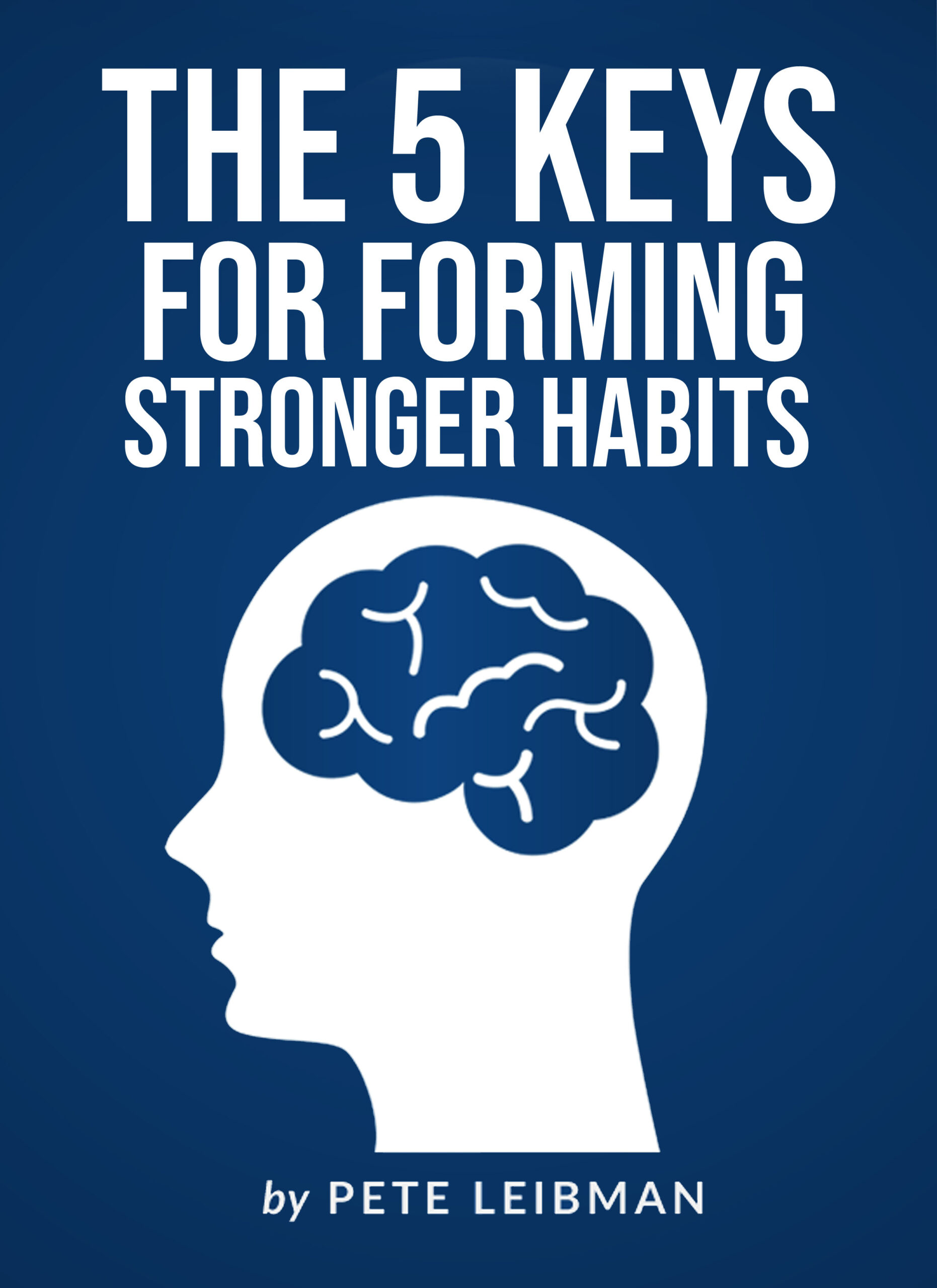
Have you ever tried to use an artificial incentive to motivate yourself to change your behavior and form stronger habits?
Maybe you promised yourself a gift for making some sort of change. Or, maybe someone else promised you a reward for making a change or achieving a goal.
In this article, you will learn why artificial incentives actually decrease (not increase) your long-term motivation. You will also learn what to do instead, if you are struggling to get motivated or stay motivated in some area of your life.
Note: If this is your first time at StrongerHabits.com, you can click here to take a free assessment that measures your habits in four areas that have a major impact on how you feel and perform each day. The assessment takes less than 3 minutes, and you get your results immediately.
Why Are Incentives A Bad Way To Motivate Yourself?
Some people encourage you to use rewards to motivate yourself to change your behavior. For example, many employers these days are providing cash prizes and other rewards for employees who walk a certain number of steps, lose a certain amount of weight, or achieve other benchmarks deemed to be healthy.
There is no doubt that the people and companies implementing these programs mean well. Unfortunately, there are significant problems with this approach. Here are two key reasons why:
1. Incentives don’t address the cause(s) of your lack of motivation.
If you are unmotivated, it’s not because you are lazy or undisciplined or because you lack willpower. Instead, you are unmotivated because of the way that you are thinking about your change or goal. You either don’t think it will be worth the effort, or you are bored with your typical approach, or you are confused on what to do, and/or you are overwhelmed.
Incentives don’t address any of these psychological barriers. Trying to motivate yourself with artificial incentives is like trying to pour water into a covered glass. It doesn’t work. (Credit for this analogy goes to Harold Stolovitch and Erica Keeps in their book Telling Ain’t Training.) [1]
2. Incentives devalue the natural rewards of the habit that you are trying to form.
When you rely on artificial forms of motivation, you perpetuate a negative, false belief that forming a good habit is a chore and something that you should only want to do if you get a prize. This approach devalues the natural rewards that you could enjoy by forming the habit. As Alfie Kohn writes in Punished by Rewards; The Trouble with Gold Stars, Incentive Plans, A’s, Praise and Other Bribes, “Anything presented as a prerequisite for something else- that is as a means toward some other end – comes to be seen as less desirable. ‘Do this and you’ll get that’ automatically devalues ‘the this.” [2]
To be clear, some studies have proven that artificial incentives can lead to short-term compliance and results. However, studies have also shown that artificial incentives not only fail to produce long-term changes, incentives can also encourage dishonest behavior, and do more harm in the long-term.
In Drive; The Surprising Truth About What Motivates Us, author Daniel H. Pink highlights an extensive meta-analysis that was conducted in 1999. Dr. Edward L. Deci and two of his colleagues led this meta-analysis and concluded the following: “Careful consideration of reward effects reported in 128 experiments lead to the conclusion that tangible rewards tend to have a substantially negative effect on intrinsic motivation.” [3]
Translation: artificial incentives decrease, not increase, your motivation over the long-term.
How Can You Increase Your Motivation Naturally?
A stronger approach is to identify the underlying cause(s) of your lack of motivation. Then, determine a strategy for overcoming those challenges and boosting your motivation naturally. You can ask yourself this question: “Why am I not motivated to __________ (insert the activity that you are unmotivated to do), and how could I make it more enjoyable, simple, and convenient?”
For example, consider a man who is struggling with his motivation to exercise. With the incentive approach, he might try something like promising himself a present if he exercises three times over the next week.
Could a bribe work for him work in the short-term? Sure. He could probably complete a few exercise sessions in order to get some sort of reward. However, this approach would ignore the reasons why he does not want to exercise. This approach would also reinforce a belief that exercise is a chore and something that he should only want to do for a prize. As a result, it’s highly unlikely that this approach would keep him motivated for months or years. In fact, the research indicates that incentives would actually decrease his long-term motivation to exercise.
The stronger approach would be for him to ask himself this question: “Why am I not motivated to exercise, and how I could make exercise more enjoyable, simple, and convenient?”
Here are three possible answers and actions for this example:
- Maybe he is not motivated to exercise because he has been forcing himself to run on a treadmill, which he finds boring. If that is the case, he could focus on other activities that might be more enjoyable for him, like running on a scenic trail in the woods, playing basketball with some friends, or taking a boxing class.
- Maybe he is not motivated to exercise because he is confused about what to do. If that is the case, he could download a fitness app, attend a group exercise class led by a trainer, or hire a coach who could help him design a simple, personalized workout program to get started.
- Maybe he is not motivated to exercise because it feels too difficult or too inconvenient for him to exercise for long periods of time. If that is the case, he could exercise for shorter periods of time at first.
Unlike the incentive approach, the stronger approach gets to the root cause(s) of your lack of motivation and helps you identify sustainable, personalized solutions to get and stay naturally motivated over the long-term.
Think of someone you know who has been consistently healthy and fit for years. Has that person achieved and maintained their health and fitness level by repeatedly bribing himself with artificial rewards? No. High performers in any area of life don’t rely on bribes or fake rewards to achieve greatness. They motivate themselves naturally by identifying and overcoming obstacles (psychological or otherwise) that could get in their way.
Summary
As Alfie Kohn writes in Punished By Rewards, “Promising a reward to someone [including yourself] who appears unmotivated – or demotivated – is like offering salt water to someone who is thirsty: it’s not the solution; it’s the problem.” [4]
If you are struggling to get or stay motivated to change your behavior, don’t try to bribe yourself with artificial incentives or prizes. Instead, be honest with yourself about what’s really causing your lack of motivation. Then, identify some ways to make your desired behavior as enjoyable, simple, and convenient as possible. When you do that, you’ll increase your motivation naturally, form stronger habits, and change your behavior for the long-term, not just for a few days or weeks.
P.S. If you enjoyed this article, you can share it by clicking a social media icon on this page.

Free eBook and Newsletter
Download my free 40-page eBook on “The 5 Keys for Forming Stronger Habits.”
You’ll also receive my free weekly newsletter on how to become your strongest self.
Your email is safe. Unsubscribe anytime.
About the author: Pete Leibman is the Creator of StrongerHabits.com. He is a best-selling author, keynote speaker, executive recruiter, athlete, and peak performance coach. His work has been featured on Fox News, CBS Radio, and CNNMoney.com, and over 500,000 people across the world have read his articles.
References for this article:
- Harold D. Stolovitch and Erica J. Keeps, Telling Ain’t Training (Alexandria: ASTD Press, 2011), 53.
- Alfie Kohn, Punished by Rewards: The Trouble with Gold Stars, Incentive Plans, A’s, Praise and Other Bribes (New York: Houghton Mifflin Company, 1993), 76.
- Daniel, H. Pink, Drive: The Surprising Truth About What Motivates Us (New York: Riverhead Books, 2012), 37; Edward L. Deci et al., “A Meta-Analytic Review of Experiments Examining the Effects of Extrinsic Rewards on Intrinsic Motivation,” Psychological Bulletin 125, no. 6 (1999): 659.
- Alfie Kohn, Punished by Rewards: The Trouble with Gold Stars, Incentive Plans, A’s, Praise and Other Bribes (New York: Houghton Mifflin Company, 1993), 76.

